
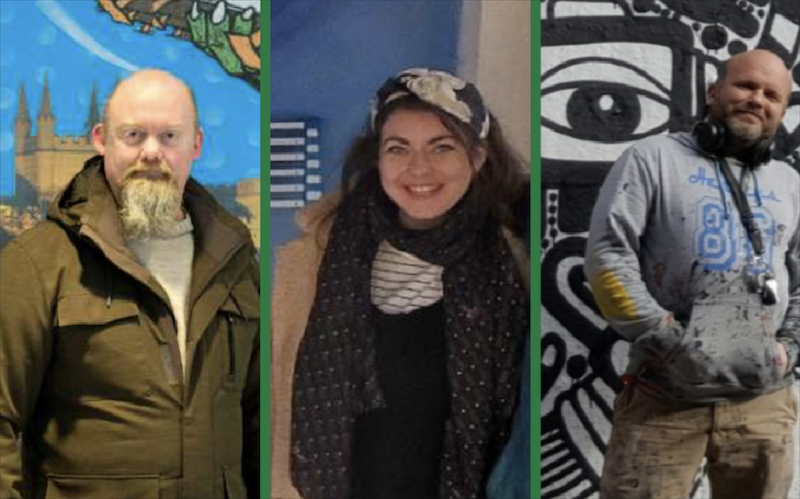

Local arts organisations say the installation or adoption of a legal place to practise street art could bring big benefits.
Not all agree on every point, but it helps lead an informed discussion.
Below you can read the thoughts of the Chairman of Art for Guernsey, Guernsey Arts' Partnerships Development Executive, and the Resident Artist at Leake Street, one of the UK's biggest attractions for lovers of street art.
If you’d like to know the author's thoughts on whether or not Guernsey should adopt a ‘legal wall’, you can check out Luke’s opinion piece HERE.
David Ummels is the Chairman of Art for Guernsey, an organisation which seeks to promote art and it’s link to community, and celebrate the artistic history of the island.
Should Guernsey organise a place to paint? - “Yes, is the answer. Yes. Simple as that. As a citizen, and as a kind of like, chair of an arts-related organisation, I have two answers or two responses to the question.
“The first one is, unfortunately, as a person, I've been made aware that there is a group of misbehaving early teenagers that is growing, and that actually is doing worse than just misbehaving. Some of their behaviour is causing a lot of frustration with the police, with the community. And they have seemed to embrace an attitude of rebellion, but they don't think it through and they cause harm to people, emotionally or physically.
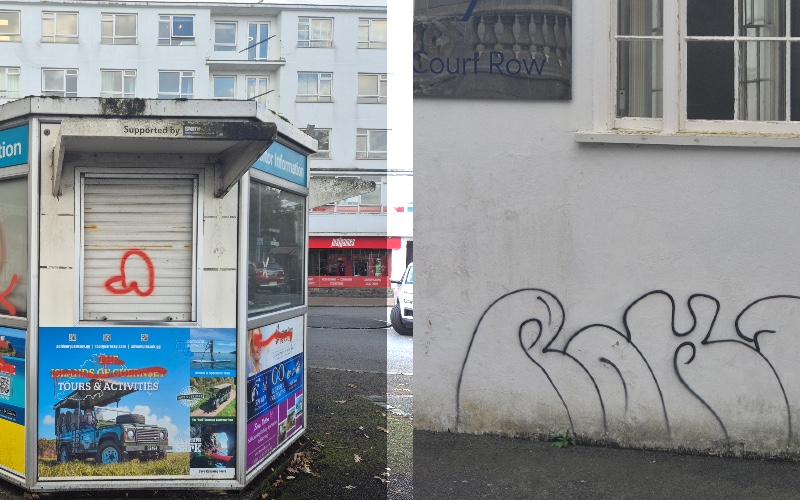
Pictured: Examples of vandalism over the past few weeks. Left, at the town Bus Terminus, Right, outside the States Chambers.
“What they do has nothing to do with art, in my opinion. So if the question is, would it help to create a set space for those guys? I'm afraid the answer is probably no, because they need much more attention than that. That could be part of the solution. Now, the second element of your question is, what about all the youngsters and less young who just love street art? Elevated skills rather than doing the odd tag? And do they need a destination? Do they need a space to express themselves? Well, most definitely, the answer would be yes.”
After being initially approached by Bailiwick Express for his thoughts on the topic, Mr. Ummels took the idea back to his team and instantly came up with a constructive way to make the most of one of Guernsey’s Industries.
“We had a kind of chat, and Jock, our curating director, came up with this brilliant idea. When we renovated the gallery here, for months and months we had white panels with the logo of the construction company who were doing the work. You may recall that we kind of beautified the panels because obviously we wanted to make a statement being an art gallery so we kind of beautified all those panels.
“Jock's idea was that it would be really easy, as we see it, would be to have some sort of partnership of purpose with a construction company, Art for Guernsey, other organisations, completely open, and just say, ‘hey, what about every time there is a significant construction site, and a ton of white panels, why not to invite artists there’. For sure, it will not attract the people who want to be rebellious and point a finger at society because they want to do things that are upsetting us, but it would attract all the guys who are really looking for a way to express themselves and feel that it's not so easy.”
Although Mr. Ummels makes it clear he believes those vandalising public or private property with art equipment wouldn’t benefit from a free and open place to paint, he does appreciate the rehabilitating nature of art.
“They need much more than that, but they do need to realise what they love, what they are good at, and express themselves. Sometimes there's a lot of anger, but art is also there for you to kind of express, so if anger it is, then anger it should be.

Pictured: David Ummels, Chairman of Art for Guernsey.
“We use Art in a very positive way strategically. We apply art to create social connections, to improve the behavior of school children, to actually extend their attention span, to give them a sense of self-belief, and last but not the least, to increase their critical thinking.
“So we can definitely apply art to allow people to express distress or anger, but also to realise that they are good at something. We had a trailblazing project a few years back with a prison where we basically turned like 60% of the inmates into exhibiting artists and some of them elected to express anger and frustration, some of them actually elected to show their skills and how good they are.
“There needs to be more work. I think the behaviour of this group of very young teenagers is quite vile, as I understand, and the police are very aware, but I don't think that the police feel that they are properly equipped in terms of the regulatory framework.”
Louise Le Pelley is the Partnerships Development Executive at Guernsey Arts, meaning she works to secure funding for the arts commission and organises many donor events for those supporting the arts in Guernsey. She’s also a self taught artist.
Should Guernsey organise a place to paint? - “A big part of 'Legal Wall' culture is tolerance, respect and the appreciation of art. These are really important values. Guernsey Arts believes that the installation of a Legal Wall would be an advantageous addition to the public arts landscape in Guernsey and allow accessibility to the arts.
“Talking about younger members of the community - not everyone has the access to art supplies or additional arts resources outside of school. We can’t solve every problem through art, but by making more resources accessible, we can create something positive. It could be argued that legal walls reduce the risks of artists and young people trying to work in unsafe or restricted areas. And since the nature of a legal wall allows for frequent updates, they also provide a low-risk space for artists of all ages to experiment with new ideas and techniques.
“There are key considerations to take into account, however. The Legal Wall would have to be somewhere easily accessible and open to supervision. We’d also have to be very mindful of the environmental impact from paint fumes - however, there are decarbonisation spray paints available. Done well and with the correct infrastructure in place, a Legal Wall could also become a great tourist attraction.
“Experimenting or participating in artwork on Legal Walls can serve as an entry point for young or emerging artists who may later transition to formal public art projects & exhibitions, or indeed... careers!
“Bjorn Martin, who designed one of the Guernsey Arts Art Arches using spray paint, has since gone on to forge a career as a professional street artist with Global Street Art.”
Although it’s occasionally mentioned in online public forums, the Arts Commission say they don’t frequently get notified about incidents of vandalism utilising spray paint, but are keen to make the same distinction Mr. Ummels did. Street Art and Vandalism don’t belong in the same sentence.
“We’d like to separate out Vandalism - which is an act of destruction - from Street Art.
“Guernsey Arts promotes public art initiatives, including street art, as these are proven to add vibrancy, footfall and economic value to urban areas. All street art projects are assessed to make sure that they add vibrancy rather than cause harm, and a number of parties are consulted and relevant permissions sought ahead of any implementation.
“We have an open door policy at Guernsey Arts, so if vandalism using spray cans is a concern for the public, we would appreciate hearing more about it.
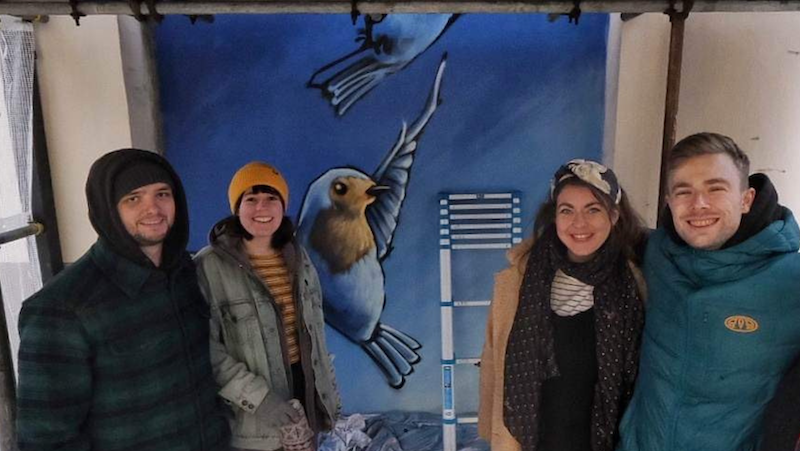
Pictured: Louise Le Pelley (inner right) is the Partnerships Development Executive at Guernsey Arts.
“Vandalism is something that occurs mostly out of boredom and a lack of respect. If there are more opportunities to get involved in sanctioned creative projects in dedicated spaces, which are easy to access with creative role models on hand to advise and support, this can only be a good thing.”
Louise Le Pelley also appealed to anyone with an interest in developing the idea of a legal wall, into a reality for artistic residents was urged to come forward.
“If anyone is interested in taking the discussion of Public Arts opportunities and development of a Legal Wall further with us, please get in touch”
Mark Craig is the Artist in Residence for the Leake Street Arches. He’s received recognition for his work with major brands such as Guinness, Wahacca, and Nescafe. As well as being a successful street artist himself, he hosts workshops in the 'Banksy Tunnels' for anyone interested in picking up a can, whether that’s new artists or interested tourists.
The History of the Leake Street Arches - “It used to be the Taxi exit for the EuroStar, and then that went up to St.Pancras, and the whole of Leake Street was closed down, and it became run down apparently.
“Then out of the blue, Banksy spoke to LCR limited, who run the space on behalf of the Government, and he created the Cans Festival in 2008, and that was the turning point, it wasn’t until after the Cans Festival that Leake Street became Leake Street.”
It’s still illegal to spray paint in the area’s around Leake Street, and there are clearly defined areas which are paintable, and those which would be classed as vandalism. There’s also a published list of rules to follow in the area, which all mainly revolve around respect for those who visit, use or pass through Leake Street. Mark says the space isn’t policed heavily, and the anarchic approach works well.
“You know, there is this amazing energy, which kind of polices itself, as long as the boundaries are in place, as long as it's contained as much as possible. It really, really works.
“Leake Street is so giving. It is so tangible in terms of its opportunity and what it gives to other people, and that's that's the trick. If you don't dictate to it, if you allow it to be whatever it needs to be, it suddenly starts presenting real opportunity.”
In other areas in the UK, ones which are heavily painted but without prior permission, brings out territorial debates and issues amongst different sub-sects, but all of that melts away in Leake Street due to the open nature.
“You've got the graffiti lot seeing the taggers, and the guys that do those amazing big pieces. They don't like the street art people because they're not gangster enough, I guess. The street art people don't like the Pasters. The Pasters don't like the Sticker people.
“Nobody likes the stencil people, because apparently it's just too easy, or whatever. Personally, when you go down to Leake Street, all of that status, all of that hierarchy, all of that weird, whatever, it kind of goes out the window.”
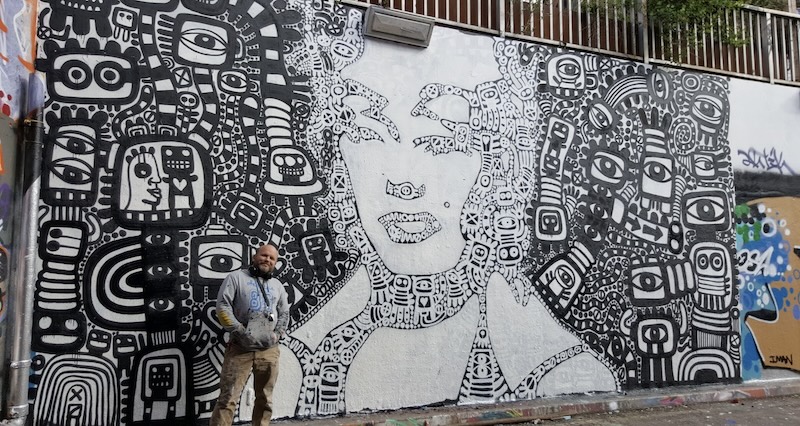
Pictured: Artist in Residence for the Leake Street Arches, Mark Craig, in front of one of his large murals.
This leveling also extends to those outside of the artistic circles. By allowing Art to have a space to breathe and exist in peace, it helps take away the negative connotations made to vandalism.
“You'd rather people embrace it and not be scared of it, because it can be quite intimidating. The whole graffiti thing in London, it's just normal, you know, it's everywhere.
“Some of it's really good, some of it's pointless. Some of it is just bizarre, but there's a lot of anti this, anti that, or, you know, you belong to this, you don't belong to that. Leake Street. None of that really matters, because it changes all the time. That's the joy of the whole Leake Street thing. It's very humbling. It's very accommodating. It makes everything equal. There's an equivalency there.”
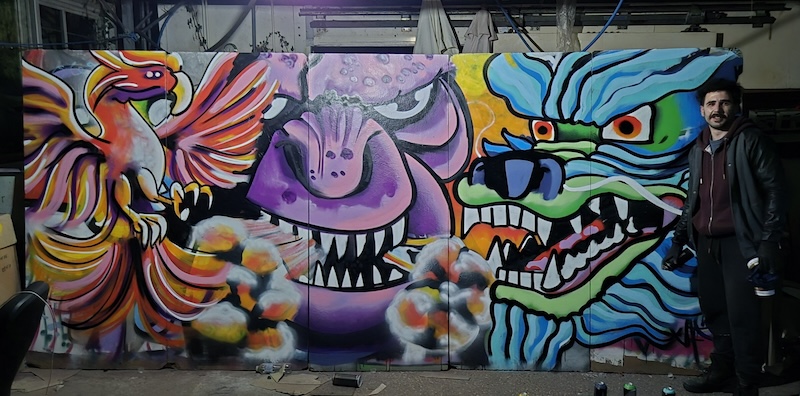
Pictured: Myself, Luke Webb, and a piece I finished earlier this week.
If you'd like to hear from our reporter Luke Webb, and his thoughts on Guernsey and Street Art adoption, you can read his opinion column HERE.